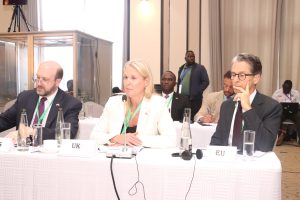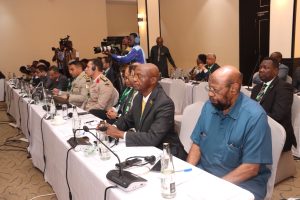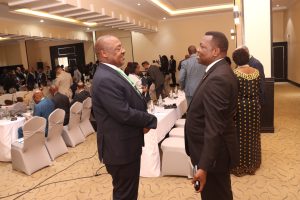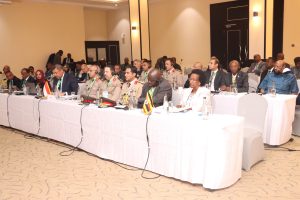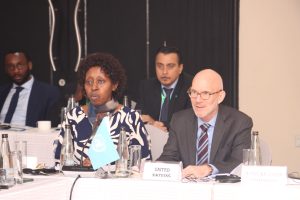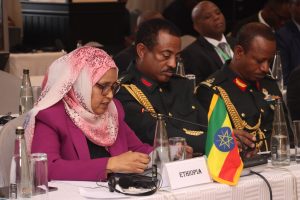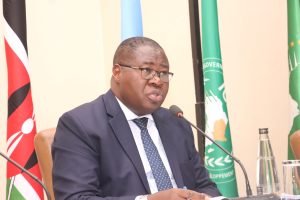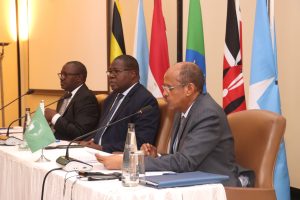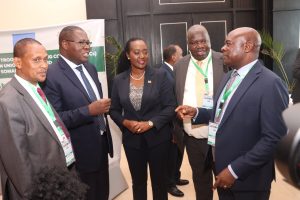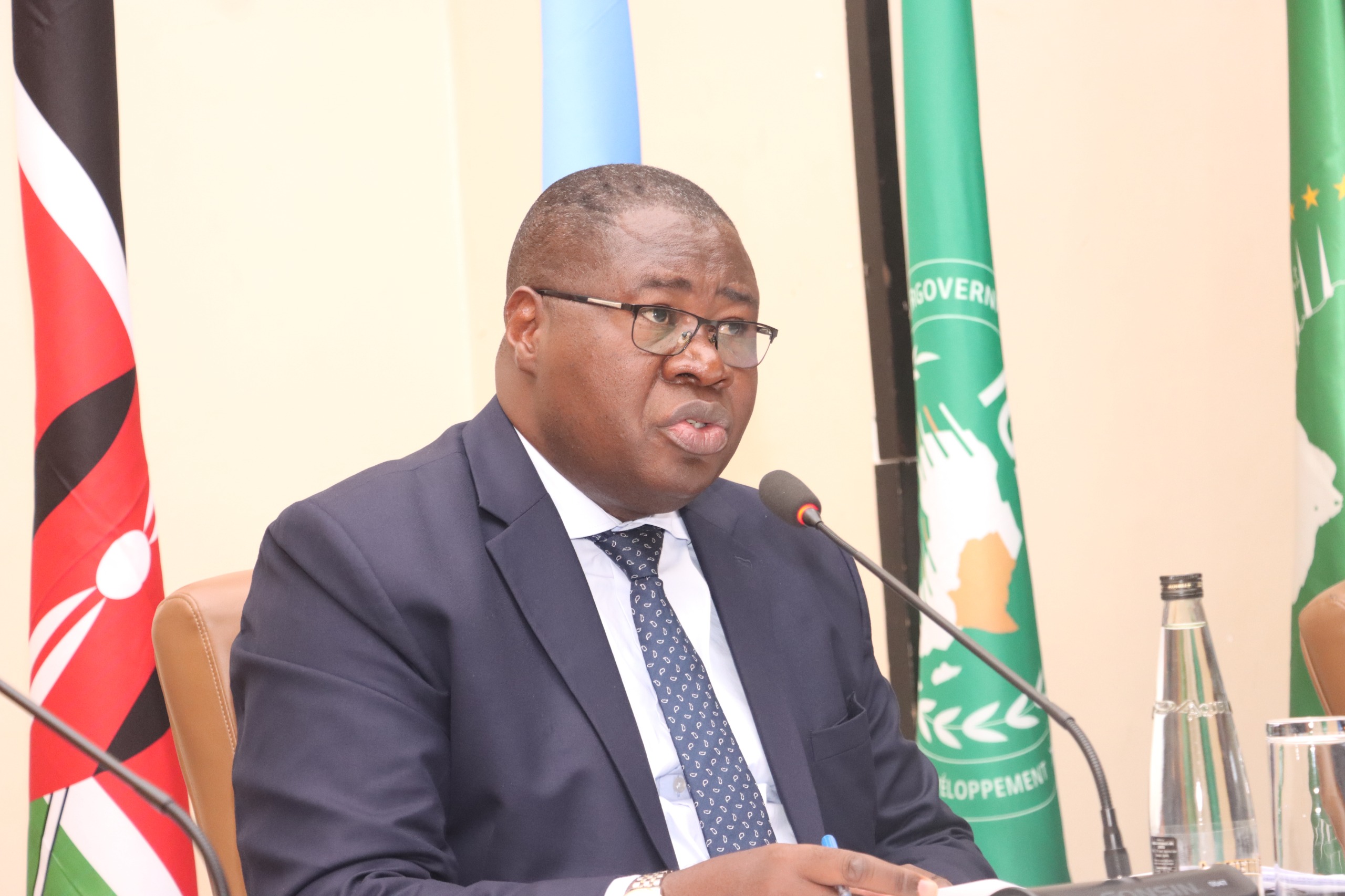
Uganda Urges Reinforcements in Somalia To Counter Escalating Al-Shabaab Threats
The Minister of Defence and Veteran Affairs of Uganda, Hon. Jacob Marksons Oboth, has issued a clarion call for increased troop deployment in Somalia, warning of the risk of losing hard-earned operational gains. This comes in light of the deteriorating security situation in the Middle and Lower Shabelle regions, where Al-Shabaab militants have recaptured some Forward Operating Bases.
The Minister made the appeal during a high-level meeting of foreign and defence ministers from Troop-Contributing Countries (TCCs) held in Kampala which emphasized the urgent need to counter the growing threat posed by Al-Shabaab and reinforce ongoing stabilization efforts in Somalia. “Terrorism remains a grave threat to Somalia and the Horn of Africa,” Hon.Oboth stated, condemning recent attacks on AU forces, Somali security personnel, and civilians.
To ensure accountability, Oboth proposed a “TCC-Somalia Peer-Review Mechanism”, chaired by H.E Yoweri Kaguta Museveni, the President of the Republic of Uganda and supported by the AU Commission, to monitor mission progress. “Despite funding shortfalls, TCCs have persevered in deploying troops under challenging conditions,” he noted, calling for additional resources from the AU Peace Fund and continued backing from international partners, including the United Nations, European Union, United Kingdom and the United States.
H.E. Mahmoud Ali Youssouf, Chairperson of the African Union Commission, echoed the need for sustained political and financial support. He emphasized the importance of implementing UN Security Council Resolution 2719, which calls for predictable and sustainable funding for African-led peace operations. “For nearly 20 years, TCCs have stood by Somalia. Thousands paid the ultimate price for peace,” Youssouf said. “AUSSOM cannot succeed without adequate resources. The AU is requesting only $190 million for 2025, far less than the $7 billion piracy once cost the world annually.”
He stressed that the AU Commission is engaging multiple partners to ensure UN statutory contributions are part of the solution, reaffirming that global peace is a shared responsibility.
Somalia’s Minister of Foreign Affairs and International Cooperation, H.E. Amb. Ahmed Moallim Fiqi expressed deep gratitude to Uganda and all TCCs for nearly two decades of sacrifice. “Your commitment and bravery have written a chapter of African solidarity that history will not forget,” he said. “We have a functioning government, a growing national army, and clear political structures. But we cannot complete this fight alone.”
He urged urgent reinforcement of quick reaction forces and a multi-sector offensive to reclaim areas recently lost to Al-Shabaab, stressing that peace in Somalia means stability for the entire Horn of Africa.
Somalia’s Minister of Defence, Hon. Jibril Abdirashid Haji Abdi, emphasized Somalia’s steady rise from fragility to a capable state. He noted the establishment of a Joint Operations Centre and ongoing implementation of the Somali Security and Development Plan (SSDP), launched in December 2023. “Our journey has not been without challenges, but with your continued support, we are forging a sovereign, peaceful Somalia,” he said. “We will never forget the sacrifices made by TCCs and partners.”
He reiterated Somalia’s commitment to working closely with all stakeholders to uphold sovereignty and inclusivity, calling on all partners to ensure reliable funding for AUSSOM.
Ministers from Troop-Contributing Countries (TCCs) including Djibouti, Egypt, Ethiopia, and Kenya reaffirmed their countries’ commitment to Somalia’s security and long-term regional stability.
The Egyptian delegation emphasized the importance of collective solidarity and coordination under the frameworks of the African Union Peace and Security Council (AUPSC) and the UN Security Council Resolution 2767 of 2024.
In a significant development, Egypt announced the elevation of bilateral relations with Somalia to a strategic partnership, following a joint political declaration signed in January 2025. They called for a strategic approach to mobilize predictable and sustainable funding for AUSOM, stressing the importance of respecting Somalia’s national ownership in combating terrorism and developing viable institutions.
They urged stakeholders to adopt a holistic model that incorporates peacebuilding, security sector reform, and capacity-building efforts.
Ethiopia and Kenya echoed similar sentiments, praising Somalia’s progress in political reforms and military cooperation.
Ethiopia’s Minister, Hon. Mohammed Mussa emphasized the need for unified action in light of recent Al-Shabaab attacks and called for innovative financing mechanisms, including public-private partnerships.
Kenya’s Cabinet Secretary for Defence, Hon. Soipan Tuya highlighted the operational challenges of the transition from ATMIS to AUSOM, pointing to donor fatigue and the urgent need for predictable funding.
She stressed that Somalia’s stability is integral to regional and global security, urging all stakeholders to act in unity.
The UN Security Council and international donors called for the finalizing of a sustainable funding model, with AU Commissioner Bankole Adeoye emphasizing the need for collective responsibility to prevent a destabilizing withdrawal.
While the AU and UN push for a hybrid financing model under UN Security Council Resolution 2719, the United States called for alternative funding mechanisms.
The UK and EU, however, have reaffirmed their commitment, with the EU insisting that the 2719 framework is the only viable path forward.
H.E Aisha Keita, head of the UN Support Office in Somalia (UNSOS), stressed the need for timely logistical coordination to sustain operations.
The meeting was also attended by the Special Representative of the Chairperson of the African Union Commission (SRCC) for Somalia, Ambassador Mohammed El-Amine Souef, AUSSOM Force Commander Lt Gen Sam Kavuma, Deputy Chief of Defence Forces Lt Gen Sam Okiding, Permanent Secretaries, diplomatic heads, and representatives from IGAD, the UK, USA, EU, and the UN.

